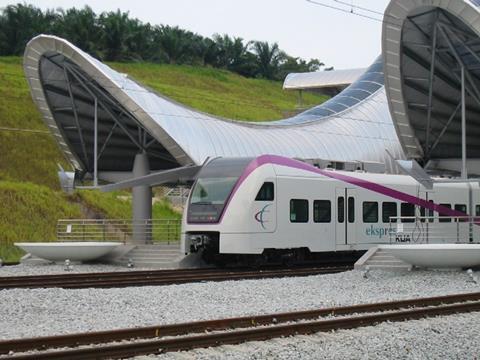
ELECTROCUTED monkeys are rarely a problem on German commuter railways, but Kuala Lumpur’s Express Rail Link and the operators of similar trains and infrastructure in Europe do have other sources of disruption in common. Sharing knowledge has brought performance benefits.
ERL’s four-car articulated ET425M Desiro EMUs are based on German Railway’s ET425, and have been carrying passengers to the Malaysian capital’s airport since April 2002, clocking up around 1·5 millionkm each. Operation is derived from German practice, and the trains are now undergoing their first T6 overhaul, carried out by local staff who were trained by Siemens.
An inspection of two trainsets was undertaken in August and September 2005, when they had covered 1·3 millionkm. This looked at the condition of the trains and the work needed across the fleet, confirming that no surprises were lurking. Systematic overhaul is now underway at Salak Tinggi depot, with each trainset being out of service for a month. One set is worked on at a time, avoiding disruption as the timetable requires nine of the 12 sets to be in service at once.
Train operation and maintenance is the responsibility of ERL Maintenance Support (E-MAS), a wholly-owned subsidiary of the ERL consortium which holds the concession for the 57 km rail link (RG 5.02 p258).
It was recognised from the start that there was no established pool of skilled workers to tap into, as the experiences of staff at national operator KTMB were different to those needed to run a 160 km/h standard-gauge line using European technology. This meant a deliberate effort would have to be made to nurture skills locally.
The turnkey construction contract was awarded to a consortium of Siemens and YTL in 1999. Siemens also held a 51% stake in E-MAS, the German firm taking railway-related risk and ERL the commercial risk. It was agreed that Siemens would help to develop local capabilities, before selling its stake to the concessionaire on June 8 2005.
E-MAS Chief Executive Udo Goldenstein is one of the few Europeans still involved with the line, and he explains that Siemens used the three-year partnership to ensure there would be no loss of expertise when its experienced staff moved to other projects.
Education was vital to ensuring smooth operation and a successful approach to maintenance, which Goldenstein says is now 65% preventative and 35% corrective. Consistency ensures reliability, and illustrated manuals detailing procedures for each task are displayed on the depot walls.
Instead of simply issuing staff with orders on how to complete individual tasks, employees were trained to appreciate factors such as track-train interaction. ’Our people should understand the systems’, explains Goldenstein, and the need for a systems approach was stressed throughout.
Wildlife and lightning have caused headaches, but the main source of trouble was the doors. Discussions with German operators found that similar problems had occurred in Europe, and E-MAS was able to adopt their proven solutions.
Punctuality has averaged 99·7% of trains running on time since the launch, with a low of 99·28% improved to a recent figure of 99·90%. A revised driving profile was developed in the light of operating experience, which increased the journey by 3min, but brought worthwhile energy savings.
The trains have a design life of 30 years, and Goldenstein hopes that his staff and trains will have similar careers, retiring together. Wages are higher than at KTMB to encourage staff retention, building up a pool of knowledge about the vehicles.
Successful knowledge transfer has helped the development of self-sufficiency, says Goldenstein. ’We are now doing everything on our own, and not with others. This gives a lot of motivation to our employees.’















